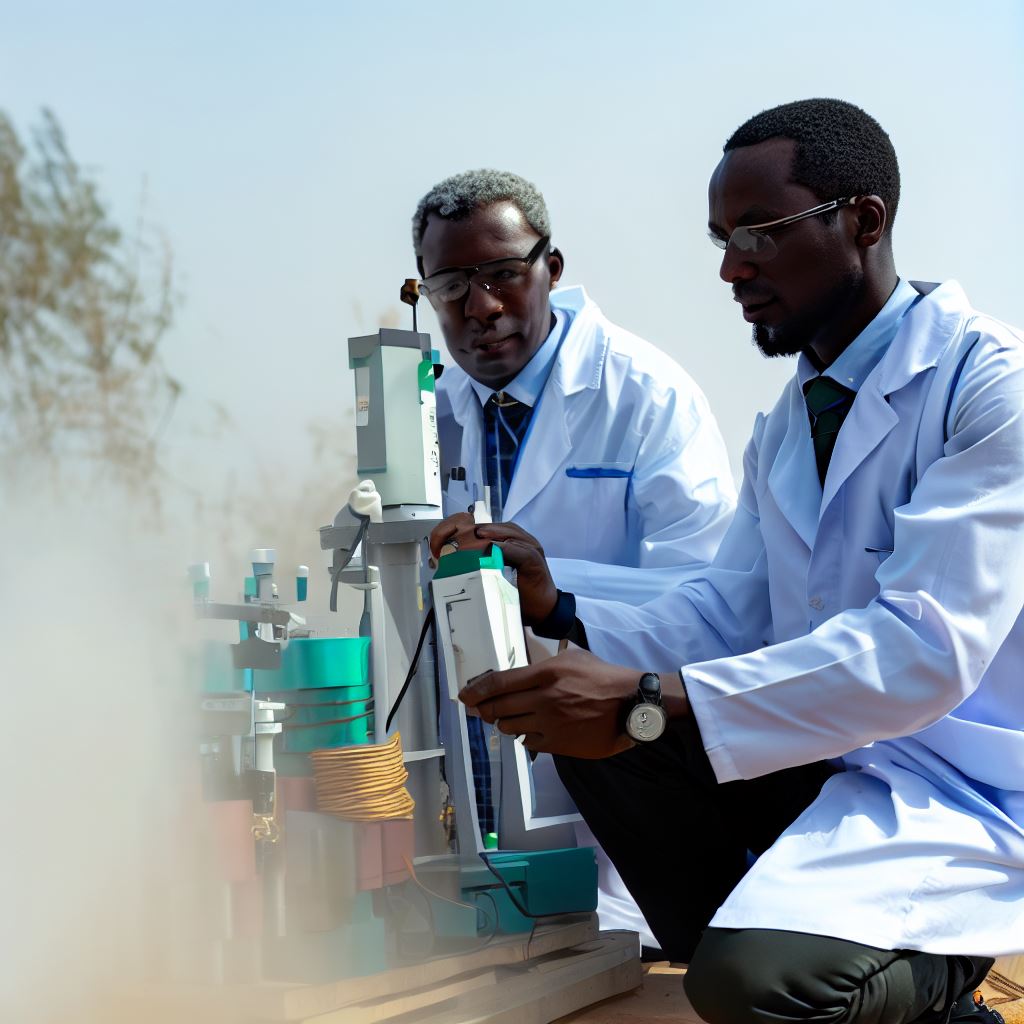Introduction
Atmospheric science jobs in Nigeria play a key role in understanding weather patterns, climate change, and environmental protection.
These jobs are crucial for the sustainable development and protection of Nigeria’s natural resources.
This blog post will provide a comprehensive guide to atmospheric science jobs in Nigeria, including qualifications, job opportunities, and career prospects.
Understanding Atmospheric Science
Atmospheric science is an interdisciplinary field that combines elements of physics, chemistry, mathematics, and computer science.
By understanding atmospheric science, we gain insights into the planet’s weather patterns, climate changes, and environmental impacts.
A. Atmospheric science and its key components
Atmospheric science is the study of the Earth’s atmosphere and its various components.
- Meteorology: the study of weather patterns, including temperature, humidity, precipitation, and wind.
- Climatology: the study of long-term weather patterns, climate changes, and their causes.
- Air Quality Science: the study of pollutants in the atmosphere and their impact on human health.
- Atmospheric Chemistry: the study of chemical processes and interactions within the atmosphere.
- Atmospheric Physics: the study of physical properties and processes in the atmosphere.
B. Relevance of Atmospheric Science in Nigeria
In Nigeria, atmospheric science is of particular relevance due to the country’s geographical location and diverse climate.
The nation faces numerous weather challenges, including heavy rainfall, tropical storms, and desertification.
These weather patterns directly impact industries, agriculture, infrastructure, and human health.
- Extreme Weather Events: Nigeria experiences flooding, droughts, and heatwaves, requiring accurate predictions and preparedness.
- Agriculture: Weather forecasting helps farmers plan their activities, optimize irrigation, and prevent crop diseases.
- Health: Monitoring air quality is essential for minimizing the health risks associated with pollution.
- Energy: Weather data is crucial for optimizing renewable energy sources like solar and wind power.
- Infrastructure: Understanding wind patterns and atmospheric conditions is vital for designing resilient structures.
C. Role of atmospheric scientists in studying and predicting weather patterns
Atmospheric scientists play a significant role in studying and predicting weather patterns, ensuring the safety and well-being of communities.
- Data Collection: They collect and analyze data using weather stations, satellites, radars, and computer models.
- Weather Forecasting: Atmospheric scientists interpret data to predict short-term weather conditions accurately. This information is crucial for day-to-day operations, including transportation, agriculture, and disaster preparedness.
- Severe Weather Warnings: They issue warnings for severe weather events, allowing people to take necessary precautions.
- Climatic Research: Scientists study long-term climate trends and patterns to understand climate change impacts. Through this research, they provide policymakers with essential information to develop appropriate strategies for climate change adaptation and mitigation.
- Environmental Impact Assessment: They assess the environmental impact of various activities and propose sustainable solutions.
- Policy Guidance: Atmospheric scientists provide scientific input for policymaking to mitigate weather-related risks.
Atmospheric science also plays a significant role in air quality management in Nigeria.
With rapid industrialization and urbanization, air pollution has become a major concern for public health.
Atmospheric scientists monitor air quality, identify pollutants, and assess their impact on human health.
This information helps policymakers formulate measures to reduce pollution and improve air quality standards.
In fact, atmospheric science is a multidisciplinary field with great relevance in Nigeria.
By studying weather patterns, climate change, and air quality, atmospheric scientists play a crucial role in ensuring the safety, health, and sustainable development of the country.
Their expertise and research findings guide policymakers, industries, and communities towards a more resilient and environmentally conscious future.
Overview of Atmospheric Science Jobs in Nigeria
A. The current state of the atmospheric science job market in Nigeria
The atmospheric science job market in Nigeria is intensely competitive, demanding specialized skills and expertise.
With the growing importance of accurate weather forecasts for agriculture, water resource management, and disaster preparedness, the demand for atmospheric scientists has surged.
Government agencies, research institutions, and private companies are all vying for the limited pool of qualified atmospheric science professionals.
As climate change continues to impact the region, there’s an increasing need for experts who can analyze and interpret climate data.
Despite the high demand, aspiring atmospheric scientists must possess advanced degrees and practical experience to stand out in this competitive field.
Networking and staying updated with the latest research and technology are essential to secure positions in atmospheric science.
The job market’s competitiveness has led to attractive compensation packages for successful candidates.
However, the high demand and competition mean that only the most qualified individuals can secure these rewarding positions.
In short, the atmospheric science job market in Nigeria is fiercely competitive but offers significant opportunities for those with the right qualifications and dedication.
B. Various industries and sectors in Nigeria offering atmospheric science jobs
- Meteorological agencies: These agencies are responsible for collecting and analyzing weather data.
- Research institutions: These institutions focus on conducting research on atmospheric conditions.
- Universities: Universities offer teaching positions and research opportunities in atmospheric science.
- Environmental agencies: These agencies work on environmental protection and climate change mitigation.
C. Significance and impact in different sectors
- Understanding climate patterns: Atmospheric science jobs help in studying and predicting climate patterns in Nigeria.
- Weather forecasting: Meteorological agencies provide accurate weather forecasts, crucial for various sectors like agriculture and aviation.
- Environmental protection: Atmospheric scientists play a key role in researching air pollution and finding ways to mitigate its effects.
- Disaster management: Atmospheric scientists contribute to disaster response systems by predicting and monitoring natural disasters like hurricanes.
- Renewable energy sector: Knowledge of atmospheric science helps in the development and efficient utilization of renewable energy sources.
In essence, the atmospheric science job market in Nigeria is competitive, with opportunities in meteorological agencies, research institutions, universities, and environmental agencies.
These jobs have a significant impact on climate understanding, weather forecasting, environmental protection, disaster management, and renewable energy development.
Read: Salary Insights: What Cartographers Earn in Nigeria
Required Skills and Qualifications
A. Essential Skills and Qualifications for Aspiring Atmospheric Scientists in Nigeria
- Strong analytical and critical thinking skills
- Proficiency in data analysis and interpretation
- Understanding of weather systems and climatology
- Ability to use scientific modeling and simulation software
- Excellent written and verbal communication skills
- Attention to detail and strong organizational skills
- Ability to work independently and as part of a team
- Knowledge of atmospheric research methodologies and techniques
B. The Significance of a Strong Background in Mathematics, Physics, and Computer Science
A solid foundation in mathematics, physics, and computer science is crucial for aspiring atmospheric scientists in Nigeria.
These subjects provide the necessary tools and knowledge for understanding and analyzing atmospheric phenomena.
Mathematics helps atmospheric scientists to develop and apply complex mathematical models that can simulate and predict weather patterns.
It enables them to analyze large datasets and perform statistical analyses, which are essential for studying climate change and making accurate weather forecasts.
Physics is fundamental to understanding the behavior of the atmosphere and its interactions with the Earth’s surface.
It explains thermodynamics, fluid dynamics, and radiation principles, crucial for understanding cloud formation, precipitation, and air pollution in the atmosphere.
Computer science plays a vital role in atmospheric science as it allows scientists to develop and use computer models for studying the atmosphere.
Proficiency in programming languages and computational techniques enables atmospheric scientists to analyze complex data sets, create visualizations, and run simulations.
C. The Importance of Continuous Learning and Professional Development in the Field
- Nigerian atmospheric scientists must engage in continuous learning and professional development to stay current and enhance their expertise.
- Atmospheric science is a dynamic field, constantly evolving with new research findings, technologies, and methodologies.
- As a result, it is crucial for atmospheric scientists to engage in lifelong learning to keep up with these advancements and contribute effectively to the field.
- Events like conferences and workshops offer atmospheric scientists networking and exposure to cutting-edge research.
- These platforms enable idea exchange and collaboration, enriching knowledge and advancing atmospheric science in Nigeria.
- Continuous learning and professional development help atmospheric scientists stay abreast of emerging techniques, data analysis tools, and scientific instruments.
- This refines skills, adapts to research changes, and contributes to understanding weather, climate change, and air quality.
Furthermore, continuous learning helps atmospheric scientists enhance their problem-solving abilities and critical thinking skills.
It equips them with the knowledge and expertise required to address complex challenges in atmospheric science and develop innovative solutions.
In summary, Nigerian aspiring atmospheric scientists need skills in analytical thinking, data analysis, and a math, physics, and computer science foundation.
They should prioritize continuous learning, collaboration, and contributions to the dynamic field of atmospheric science.
Read: Meet Nigeria’s Top Atmospheric Scientists: A Review

Career Paths and Opportunities in Atmospheric Science
A. Different Career Paths in Atmospheric Science
- Meteorologist
- Climatologist
- Air quality specialist
- Environmental consultant
B. Details about Each Career Path
1. Meteorologist
Meteorologists study the Earth’s atmosphere to understand weather patterns and make forecasts.
They analyze data, use computer models, and communicate weather information to the public.
- Average Salary: $97,580 per year
- Potential for Growth: The demand for meteorologists is expected to grow by 8% in the next decade.
2. Climatologist
Climatologists study long-term trends in weather conditions and climate patterns. They collect and analyze data to understand climate change and its impacts on the environment.
- Average Salary: $84,500 per year
- Potential for Growth: The demand for climatologists is expected to grow by 10% in the next decade.
3. Air Quality Specialist
Air quality specialists monitor and analyze air pollutants and develop strategies to improve air quality.
They work with government agencies, industries, and communities to implement pollution control measures.
- Average Salary: $67,460 per year
- Potential for Growth: The demand for air quality specialists is expected to grow by 4% in the next decade.
4. Environmental Consultant
Environmental consultants assess the impact of human activities on the environment and develop strategies for sustainable practices.
They provide guidance to organizations and help them comply with environmental regulations.
- Average Salary: $72,520 per year
- Potential for Growth: The demand for environmental consultants is expected to grow by 8% in the next decade.
C. Opportunities for Specialization within the Field
Atmospheric science offers various opportunities for specialization based on specific areas of interest or expertise.
- Climate modeling and analysis
- Air pollution and remediation
- Weather forecasting and prediction
- Climate change impacts and adaptation
- Environmental policy and regulation
Specializing in a specific area allows professionals to gain in-depth knowledge and skills, making them valuable assets in their respective fields.
Read: Using GIS in Nigeria: A Cartographer’s Perspective
Education and Training
A. Available Educational Programs and Institutions
- University of Lagos: Offers a Bachelor’s degree in Atmospheric Science and Meteorology.
- Federal University of Technology Akure: Provides a Bachelor’s degree program in Meteorology.
- The University of Nigeria Nsukka: Offers a Bachelor’s degree program in Atmospheric Physics.
- Nigerian Meteorological Institute: Provides specialized training programs in atmospheric science.
B. Scholarships and Funding Opportunities
- Nigerian Meteorological Society (NMetSoc) Scholarship: A competitive scholarship awarded annually to outstanding students pursuing atmospheric science.
- Federal Ministry of Education Scholarship: Offers financial assistance to deserving Nigerian students studying atmospheric science.
- International Scholarships: Various international organizations and institutions provide scholarships for Nigerian students interested in atmospheric science.
- Research Grants: Several research institutions offer funding opportunities for students to conduct atmospheric science research.
C. Importance of Internships and Practical Experience
- Hands-On Learning: Internships provide real-world experience, enabling students to apply their theoretical knowledge in practical scenarios.
- Skill Development: Internships offer opportunities to develop essential skills such as data analysis, forecasting, and meteorological instrument operation.
- Networking: Internships connect aspiring atmospheric scientists with professionals, nurturing relationships and potential mentorships.
- Increased Employability: Practical experience gained through internships enhances job prospects and makes candidates more desirable to potential employers.
Most importantly, Nigeria provides various educational programs in atmospheric science through institutions.
They include University of Lagos, Federal University of Technology Akure, University of Nigeria Nsukka, and the Nigerian Meteorological Institute.
Scholarships and funding opportunities, including the NMetSoc Scholarship and Federal Ministry of Education Scholarship, support students financially.
Additionally, international scholarships and research grants provide avenues for further support.
Internships and practical experience are vital for aspiring atmospheric scientists, providing hands-on learning, skills, networking, and employability.
Pursuing a career in atmospheric science in Nigeria is both rewarding and supported by a robust educational and training framework.
Learn More: Job Opportunities: Operations Research Analysts in Nigeria
Job Search Tips and Resources
A. Practical Tips for Job Seekers in the Atmospheric Science Field
- Research the job market and stay updated on the latest trends and developments.
- Tailor your resume and cover letter to highlight relevant skills and experiences.
- Prepare for interviews by practicing common interview questions and showcasing your knowledge.
- Enhance your skills by taking courses or pursuing certifications related to atmospheric science.
- Seek internships or volunteer opportunities to gain practical experience in the field.
- Attend conferences, workshops, and seminars to network with professionals and industry experts.
- Build a strong online presence by creating a professional website or LinkedIn profile.
- Stay positive and persistent in your job search, as finding the right opportunity may take time.
B. Online Job Portals and Professional Networking Platforms
- Jobberman: A popular Nigerian job portal that offers numerous opportunities in atmospheric science.
- Ngcareers: This platform connects job seekers with top employers in the atmospheric science field.
- LinkedIn: Build your professional network, explore job postings, and connect with industry professionals.
- Indeed: A widely used job search engine where you can find atmospheric science job listing.
- Glassdoor: Get access to company reviews, salary information, and job listings in the atmospheric science industry.
C. Networking and Building Professional Connections
Networking plays a crucial role in the job search process within the atmospheric science field.
Building professional connections can provide valuable insights, job referrals, and access to hidden job opportunities.
Here are some effective ways to network:
- Attend conferences, workshops, and seminars related to atmospheric science.
- Join professional organizations and actively participate in their events and discussions.
- Reach out to alumni or professionals working in the field for informational interviews.
- Utilize online networking platforms like LinkedIn to connect with industry experts.
- Create and maintain a strong online presence by sharing relevant content and engaging with others in the field.
- Volunteer for research projects or community initiatives related to atmospheric science.
Generally, atmospheric science job seekers should follow practical tips, use online job portals and networks, and prioritize building connections.
By adopting these strategies, individuals can increase their chances of finding rewarding job opportunities in atmospheric science in Nigeria.
Read: The Impact of Cartography on Nigeria’s Development
You Might Also Like: Career Progression for Optical Technicians in Nigeria Explained
Conclusion
This blog post has discussed the various aspects of atmospheric science jobs in Nigeria.
It is important to reinforce the significance of these jobs in understanding and predicting weather patterns, climate change, and natural disasters.
I encourage readers to consider a career in atmospheric science and explore the available opportunities in Nigeria.
By pursuing this field, we can contribute to the betterment of our environment and society.




